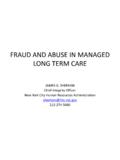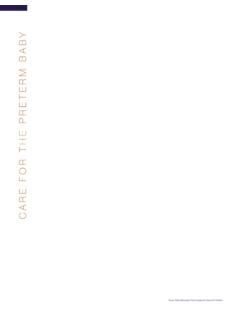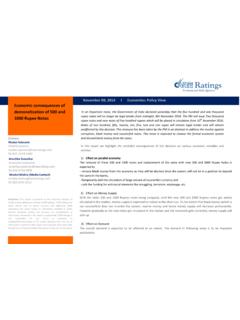Transcription of LONG-TERM CARE ETHICAL CHOICES IN LONG …
1 LTCE xisting systems of LONG-TERM carefor people with chronic illnesses anddisabilities are not enough to meetthe growing demand. Though unpaidfamily members will continue to playa central role in providing care , statesmust ensure that resources are avail-able to address growing needs andthat those resources are distributedefficiently and society invites a dialogue abouthow best to structure the ethicalframework within which equitable, fair,rational, and transparent decisionsabout LONG-TERM care can be madewhen it asks: What LONG-TERM careneeds exist? What resources areavailable to provide them? Whatdoes justice require? The answerspoint the way towards systems thatare responsible, accessible, efficient,and accountable, and that addressthe universe of human needs withdignity and primary goal of this report is toreflect on the moral basis of long -termcare and to identify some of the is-sues that need to be considered asthose systems are designed.
2 ISBN 92 9 156228 5 LONG-TERM care ETHICAL CHOICES world health ORGANIZATIONW orld health OrganizationETHICAL CHOICES INLONG-TERM care :WHAT DOES JUSTICEREQUIRE? ETHICAL CHOICESIN LONG-TERM care :WHAT DOES JUSTICEREQUIRE? world health OrganizationWHO Library Cataloguing-in-Publication DataEthical CHOICES in LONG-TERM care : what does justice require? ( world health organization collection on LONG-TERM care ) care - ethics ethics health organization ISBN 92 9 156228 5 (NLM classification: WX 162) world health organization 2002 All rights reserved. Publications of the world health organization can beobtained from Marketing and Dissemination, world health organization , 20 Avenue Appia, 1211 Geneva 27, Switzerland (tel: +41 22 791 2476; fax: +4122 791 4857; email: Requests for permission toreproduce or translate WHO publications whether for sale or fornoncommercial distribution should be addressed to Publications, at theabove address (fax: +41 22 791 4806; email: designations employed and the presentation of the material in thispublication do not imply the expression of any opinion whatsoever on thepart of the world health organization concerning the legal status of anycountry, territory, city or area or of its authorities, or concerning thedelimitation of its frontiers or boundaries.))
3 Dotted lines on maps representapproximate border lines for which there may not yet be full mention of specific companies or of certain manufacturers productsdoes not imply that they are endorsed or recommended by the world HealthOrganization in preference to others of a similar nature that are notmentioned. Errors and omissions excepted, the names of proprietaryproducts are distinguished by initial capital world health organization does not warrant that the informationcontained in this publication is complete and correct and shall not be liablefor any damages incurred as a result of its named authors alone are responsible for the views expressed in and designed by Oni Annette LaGioia, Anet Ukiah CAPrinted in FranceThis document can be found on the WHO web DOES JUSTICE REQUIRE? Contentsiiiiii Overview.
4 2 The Societal Perspective ..3 The Role of the Family ..4 Other Stakeholders ..5 The Caregiving Relationship ..6 LONG-TERM care and Social Justice ..7 The Way Forward ..8 References ..vvii15 111517212527 ETHICAL CHOICES IN LONG-TERM CAREivAPPENDICESA. LONG-TERM care and Social Justice:A Challenge to Conventional Ideasof the Social ContractMartha C. 31B. Justice and LONG-TERM care :Need We Abandon Social Contract Theory?A Reply to NussbaumNorman Daniels .. 67C. Can Contractualism Justify State-SupportedLong-Term care Politics?Or, I d Rather Be Some Mother s ChildA Reply to Nussbaum and DanielsEva Feder Kittay .. 77D. The African PerspectiveDan Kaseje and Bavon Mpenda .. 85E. List of Participants .. 87 This report was produced under the overall direction of Daniel Wikler, PhDand Miriam Hirschfeld, DNSc, Director of WHO s Cross-Cluster Initiativeon LONG-TERM care . It synthesizes a WHO-sponsored consultation held atthe University of Chicago in July 2002 and reflects additional input from theauthors: Daniel Wikler, PhD, professor of ethics and population health atHarvard University in Cambridge, Massachusetts, Dr.
5 Hirschfeld, and KarynL. Feiden, an editorial consultant in New York thanks to the workshop participants and particularly to MarthaNussbaum, Norman Daniels and Eva Kittay, whose written contributions tothe ethics discussions are included as an Appendix. Thanks also to Kaseje and Bavon Mpenda for their contribution on the African book was designed by Oni Annette LaGioia of Anet Ukiah, care for people with chronic illnesses and disabilities presents anurgent challenge around the world . A recent WHO study estimates that in manydeveloping countries the need will increase by as much as 400% in the comingdecades (WHO, 2002a). Existing systems of care , which typically rely on un-paid family members, are not by themselves enough to meet growing families will continue to play a central role, states must ensure thatresources are available to address growing needs and that those resourcesare distributed efficiently and society invites a dialogue about how best to structure the ETHICAL frameworkwithin which equitable, fair, rational, and transparent decisions about long -termcare can be made when it asks: What LONG-TERM care needs exist?
6 Whatresources are available to provide them? What does justice require? Theanswers point the way towards systems that are responsible, accessible,efficient, and accountable, and that address the universe of human needs withdignity and primary goal of this report is to identify some of the issues that need to beconsidered as those systems are designed. It reflects a consultation held overa two-day period at the University of Chicago in July, 2002 under the sponsor-ship of the world health organization s Cross-Cluster Initiative on long -TermCare. Philosophers, experts in public health and LONG-TERM care , and profes-sionals knowledgeable about developing countries came together (see Par-ticipant List, page 87) to reflect on the moral basis of LONG-TERM care and topoint the way forward. Their goal was not to reach consensus but rather todiscuss relevant topics from many perspectives and to suggest an agenda forethical considerations.
7 Much more work in this arena lies SOCIETAL PERSPECTIVEP utting respect for human dignity at the center of the social paradigm meansaccepting laws and social practices that protect the weak and vulnerable fromdomination, exploitation, or neglect. Society functions best as a harmoniouswhole when care that is consistent with respect for the individual is available toall, enabling those who have resources to enjoy their full benefits, while providingsecurity to those who are less CHOICES IN LONG-TERM care viiiFrom that perspective, societies should not be organized only with the idea ofthe normal person in mind, though they often are. A broader obligation tocater to the needs of those with some sort of limitation must also be recog-nized. Implied is that all people, including those with disabilities, have the rightto function as fully as their condition permits, regardless of their starting challenge then becomes removing any barriers that impede that REALITY OF SCARCITY: Only after acknowledging a fundamental ethicalobligation to provide care can a society engage in a discussion of the necessarytradeoffs.
8 In an environment of resource limitations, needs inevitably competeagainst one another as priorities are established and CHOICES are made. Publicdeliberation can focus on cost thresholds, how best to define reasonable accommodation, and where extra costs outweigh the level of benefit but thebasic obligation for care must first be OF GENDER: Tradition, deeply embedded notions of a woman ssocial worth and the value of her work, and the distribution of power within asociety all explain, in part, why caregiving tasks have fallen disproportionatelyon women. Optimally, caregiving responsibilities should be shared withoutreference to gender. But if females continue to provide the bulk of the caregiving,limitations to their responsibility need to be considered in pursuit of AND DISCRIMINATION: In addition to a gender bias in the burden ofcaregiving, age bias may manifest itself in resource allocation decisions, in thelegal framework, and in the way in which the social obligation to the ailing elderlyis defined.
9 There may likewise be a bias towards anyone who is disabled thatcolors the design of support systems, or that creates unethical distinctionsbetween those whose disabilities can and can not be remedied. There is alsoin many societies a bias against isolated rural areas, with planning that fails torecognize their special needs and REFORMS: As health sector reforms are implemented, a minimumset of justice-based entitlements needs to be defined. An opportunity exists toincorporate some elements of LONG-TERM care into the package of services thatMember States make available to all. Any universal package should be viewedas a starting point, however, not a limitation, so that the subset needs of smallergroups also receive PRODUCTIVITY: Basic justice requires that respect for persons,not productive capacity, undergird decisions about who gets what. Only in themost extreme situations can capacity serve as the basis for allocatingresources for example, where the survival of other family members dependson a breadwinner s access to care .
10 Even then, it should be clearly understoodthat justice is not served. On the other hand, the goal of providing the resourcesWHAT DOES JUSTICE REQUIRE?and opportunities individuals with disabilities need to reach optimal capacitycan legitimately be considered in developing LONG-TERM care care : The decision to place a family member in an institutionshould not be an act of desperation, as it so often is now, but a reasonedchoice. A starting place for change is to be explicit that LONG-TERM care institutionsexist within a community and are not exempt from community ethics andprevailing standards. Any societal commitment of resources to build institutionsneeds to be accompanied by a commitment to the basic human dignity ofthose who will use ROLE OF THE FAMILYBy recognizing that families are neither exclusively, nor necessarily, constructsof biology, but are also shaped by social conventions and cultural values, thedistinction between what families and what society owe an individual needingcare begins to blur.


















